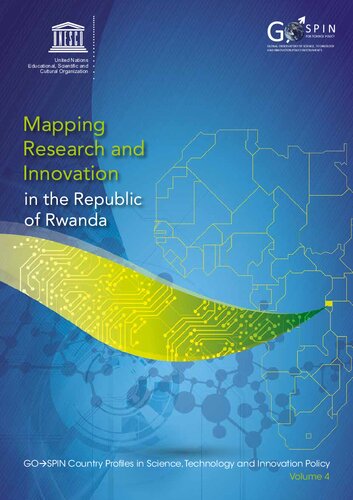Product desciption
Mapping Research And Innovation In The Republic Of Rwanda Guillermo A Lemarchand And April Tash by Guillermo A. Lemarchand And April Tash, Eds. 9789231001260, 9231001264 instant download after payment.
The growing complexity of science and innovation systems and the interface with society have been
accompanied by a more complex policy environment. This results in a need for better co-ordination and
coherence at national level. One of the most crucial factors is the increasingly global nature of the issues
with which national policy-makers are confronted. In a whole series of areas, such as the environment,
telecommunications, health, energy, education and intellectual property, it no longer makes much sense
to construe problems in purely sectoral and national terms. In a world that is becoming daily more
interdependent, policy-making is inevitably assuming an increasingly transversal and global dimension. In
this context, science, technology and innovation (STI) policy systems have emerged as interconnections
between knowledge, values, national and international socio-economic, environmental, technological and
organizational components.
UNESCO has a long tradition of supporting Member States in policy development. With the convergence
of S&T fields, the need to harness science, engineering, technology and innovation (SETI) for human and
economic development and the transnational nature of today’s challenges, STI policy processes have
become a much more complex undertaking.
It is our vision that STI policies are transversal, cross-cutting policies that support and build the structural
pillars for sustainable development. Therefore, UNESCO is conscious that monitoring and evaluating the
impact of explicit and implicit policies and instruments is part of our work in supporting the design and
implementation of STI frameworks in our Member States.
Mapping Research and Innovation in the Republic of Rwanda is the fourth in a series of a series of country
profiles prepared by the Global Observatory of Science, Technology and Innovation Policy Instruments
(GOàSPIN), a new UNESCO initiative.
The GOàSPIN programme is helping Member States to reform and upgrade national science systems
and governance, and to build capacity to monitor and evaluate performance through SETI and social
indicators. In this way, the scope of standard SETI assessment can be widened, to take into account
country-specific contexts, as well as emerging knowledge of technological advances that contribute
to sustainable development. Complementing efforts to promote evidence-based SETI policy-making,
GOàSPIN offers a good basis for the promotion of scientific and technological foresight studies.
Through the GOàSPIN programme, UNESCO’s Division of Science Policy and Capacity Building is
working as a standard-setter, assisting in the elaboration of guidelines for SETI policy formulation, review
and reforms, including monitoring and evaluation of policies and programmes. In this context, scientific
advisory systems for governments and parliaments are necessary, as well as the availability of a wide range
of scientific assessments to inform policy- and decision-makers and to bridge the gap between science
and policy.
The Division of Science Policy and Capacity building has been collaborating with the Ministry of Education
of the Republic of Rwanda with the support of the Embassy of Sweden in Kigali and the Swedish
International Development Cooperation Agency (SIDA) to produce this country profile.


